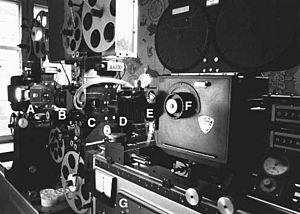Optical printer facts for kids

An optical printer is a special machine. It helps filmmakers copy and change movies. It uses one or more movie projectors connected to a movie camera. This lets people re-film parts of a movie. Optical printers are used to create cool special effects for films. They also help copy and fix old movies.
Optical printers can make many neat visual tricks. These include:
- Fade outs (the screen slowly goes dark)
- Fade ins (the screen slowly gets brighter)
- Dissolves (one scene slowly changes into another)
- Slow motion (things move slower than normal)
- Fast motion (things move faster than normal)
- Matte work (combining different images, like putting an actor in front of a painted background).
Sometimes, many different parts of a scene were combined using an optical printer. The goal was for the audience not to notice the special effects. However, sometimes the picture quality would change a little when these effects were used.
History of Optical Printers
The first simple optical printers were built in the early 1920s. A person named Linwood G. Dunn made the idea much better in the 1930s. Optical printers kept getting better until the 1980s. By then, small computers were used to control them.
From Optical to Digital Effects
Since the late 1980s, a new method called digital compositing started to take over. This is when special effects are made using computers. By the mid-1990s, almost all movie effects were made digitally. Today, optical printing is mostly used by artists who work with actual film. It's very useful for copying film that has been painted on or changed by hand.
Images for kids
See also
 In Spanish: Impresora óptica para niños
In Spanish: Impresora óptica para niños
 | William M. Jackson |
 | Juan E. Gilbert |
 | Neil deGrasse Tyson |


